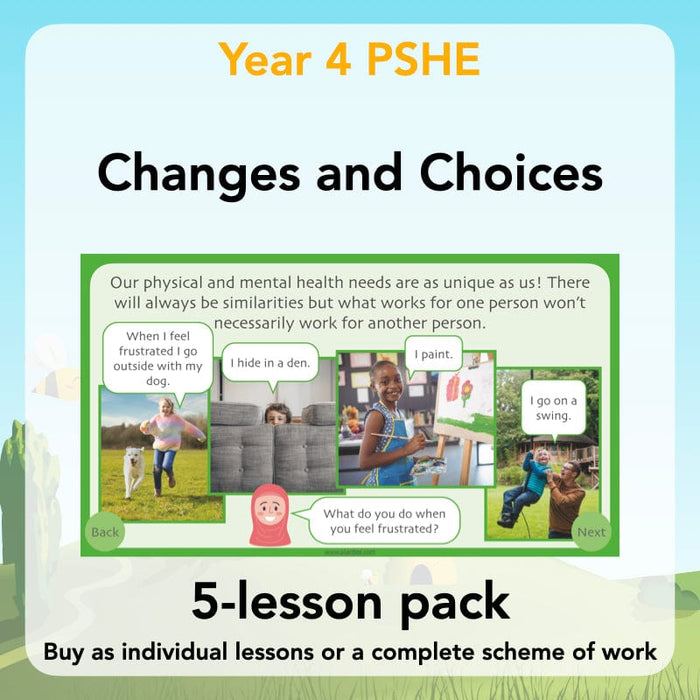

This Changes and Choices PSHE scheme of work for Year 4 fits into our Self and Emotional Wellbeing strand. The lessons encourage children to think about what mental and physical health are, how to appropriately express emotions, know when to seek support and much more.
In the first lesson of this KS2 PSHE scheme, children learn what mental and physical health are and why they are important. In the following lesson, children learn the important skill of being able to express feelings and understanding that feelings are transient. Then, the children look critically at the time they spend online. Learning what bullying is and how to combat it is the focus of the next lesson, and finally, children look at how feelings can impact others and when to seek help.
Everything you need to teach these five engaging PSHE KS2 lessons is included! For each lesson, there is a detailed lesson plan with differentiated activities, a high-quality slideshow and all the printable resources required.
A Knowledge Organiser is available to support the learning in this scheme. It is included in the Complete Series download or can be purchased individually.
Looking for more resources to help develop Self and Emotional Wellbeing? Check out our Self and Emotional Wellbeing collection of PSHE schemes to help your class recognise their personal qualities, interests, values and strengths in order to develop a sense of identity and self-worth.
Physical and Mental Health
In this lesson children will learn about the differences between physical and mental health. They will think about ways they can achieve good mental and physical health, as well as times our needs might change.
The lesson ends by asking the children to think about what motivates them. They will learn the difference between intrinsic motivations and extrinsic motivations, then start to categorise their motivations.
What's included:
- Lesson plan
- Slides
- Activity ideas
- Worksheets
Feelings are Transient
In this lesson, children will gain insight into how emotions feel inside their bodies and what emotions look like to others. They will be reminded that feelings are transient as they picture a storm passing or reaching the end of a tunnel.
Children will be reminded that all feelings are OK, but not all behaviours are OK. They will think about why it is important to stay in control of an emotion and reflect on different regulation strategies. Children will then think about times they have wanted to hide an emotion and why people may not want to show how they are feeling.
This lesson concludes by introducing the term 'rescuer'. Children will think about what a rescuer is and if rescuing someone is always the right course of action. They will look at some scenarios about when supporting someone through a challange is a more appropriate course of action than fixing the problem for them.
What's included:
- Lesson plan
- Slides
- Activity ideas
- Worksheets
- Question Cards
Critically Examine Time Online
Children will think critically about the time they spend online to gain insight into their internet use. They will think about screen and screen-free time, online and offline time, and the devices and platforms they use. Children will be encouraged to think about the positives and negatives of being online while thinking about screen use in general.
The children will learn about the potential of screens to be addictive and be introduced to the effect dopamine has on the body. They will be encouraged to think of alternatives to spending time online to help them take breaks from screens.
What's included:
- Lesson plan
- Slides
- Activity ideas
- Worksheets
- Prompt Cards
What is Bullying
In this lesson, children will learn about bullying. They will reflect on the differences between unkind behaviour, banter and bullying. Then they will learn how to spot when behaviour crosses the line and becomes bullying.
Children will explore what an upstander is, and think about the pressure to conform. They will be reminded when to seek help from a trusted adult.
What's included:
- Lesson plan
- Slides
- Activity ideas
- Worksheets
- Scenario Cards
Seeking Support
In the final lesson in this scheme, children will explore the concept of some feelings being harder to hold than others. They will think about some feelings in the context of being prickly and prickling other people.
Your class will discuss a range of situations and hypothesise what each child might do next and what the outcome of their reaction might be. Then they are encouraged to think about appropriate responses to challenging situations. They will think about when to ask for help from a trusted person.
This lesson concludes by asking the children to reflect on the key points covered in the unit.
What's included:
- Lesson plan
- Slides
- Activity ideas
- Scenario Cards
- Story Sheet
- Score Cards
This Year 4 PSHE Knowledge Organiser has been created to complement our PSHE Self and Emotional Wellbeing strand. It is designed to support your children’s understanding of key vocabulary linked to this scheme of work. A thinking question and a big idea have been included to encourage your children to think deeply about this topic.
Get the book
These lessons are based on How to be a Lion by Ed Vere, available to buy now from our Bookshop store:
Bookshop.org is an online bookshop with a mission to financially support local, independent bookshops. 10% of every sale via our store goes to independent UK booksellers and the carbon emissions from every delivery are offset.




























































